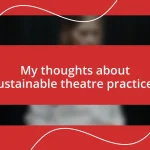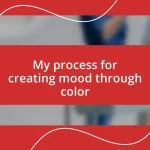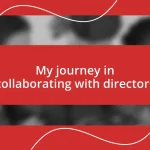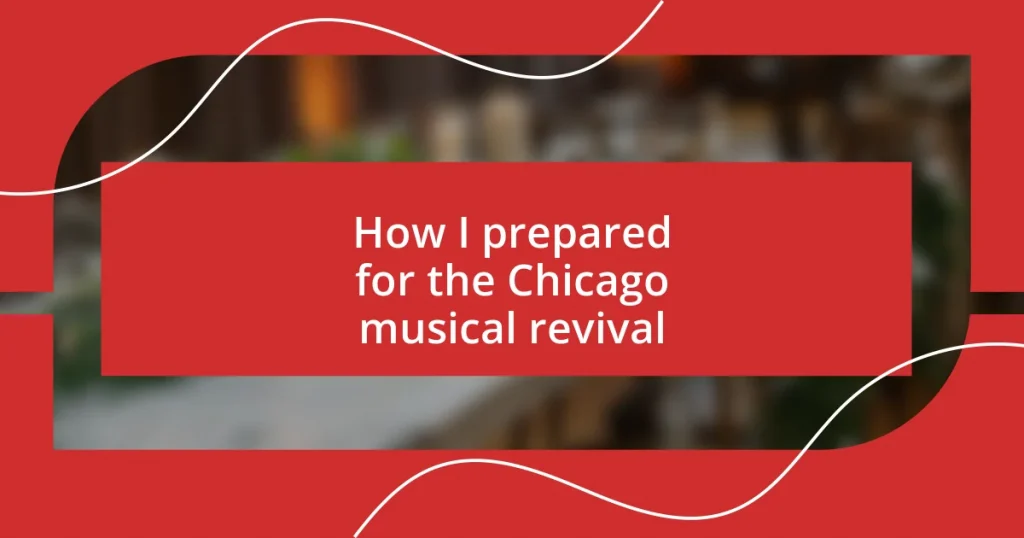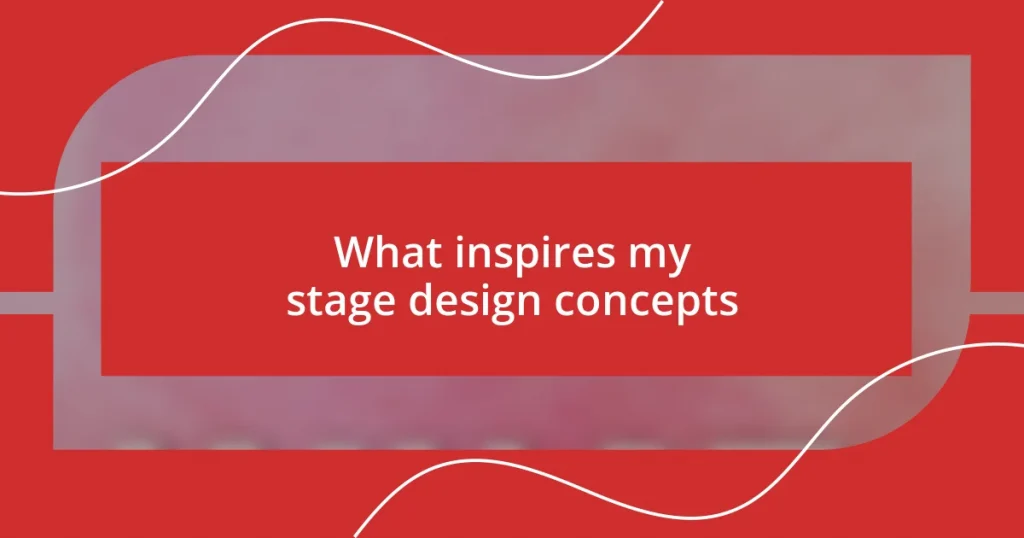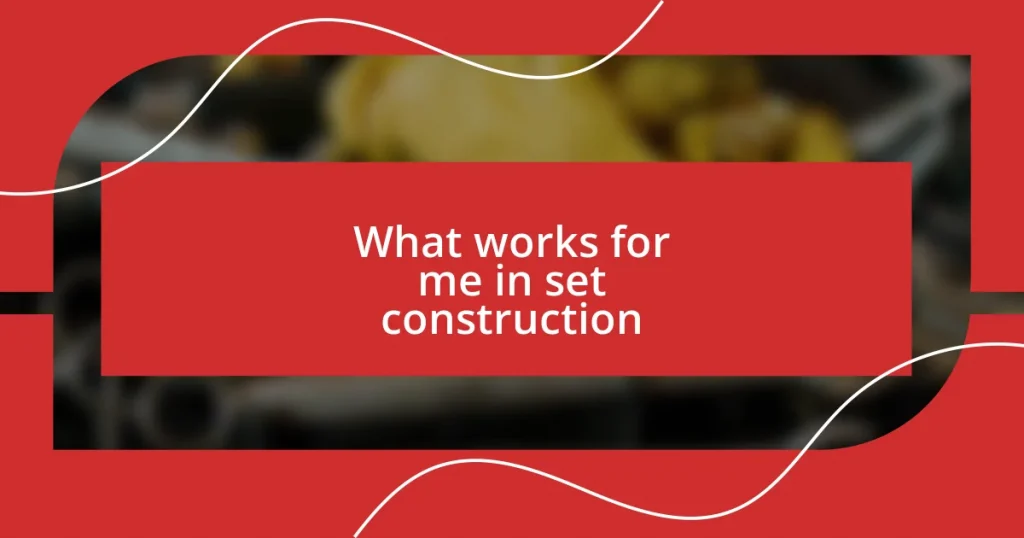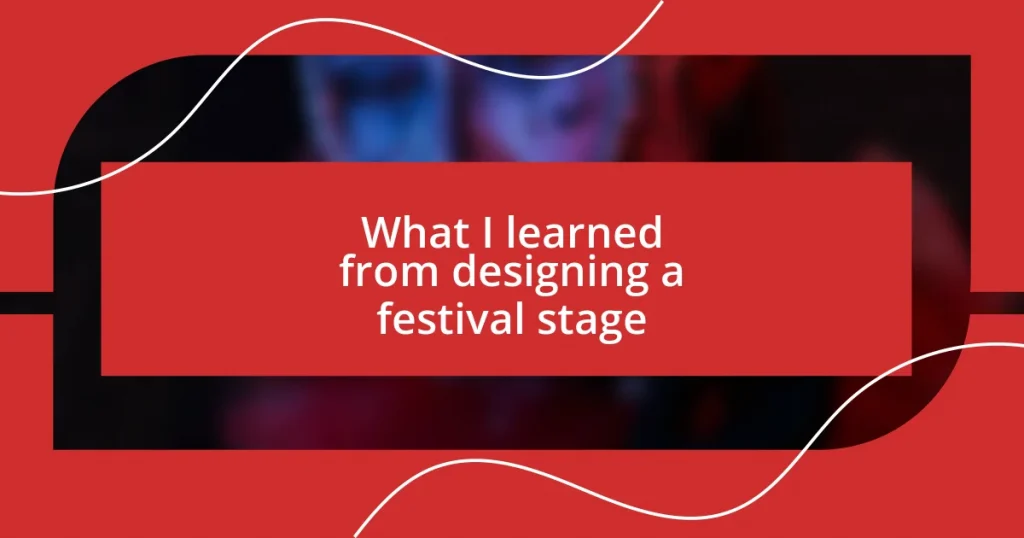Key takeaways:
- Researching the Chicago musical revival revealed the importance of passion behind revivals and how choreography shapes storytelling.
- Effective preparation enhances confidence and teamwork, making every detail a meaningful connection to the show.
- Seeking feedback from mentors and peers can provide valuable insights and reshape performances, fostering deeper artistic connections.
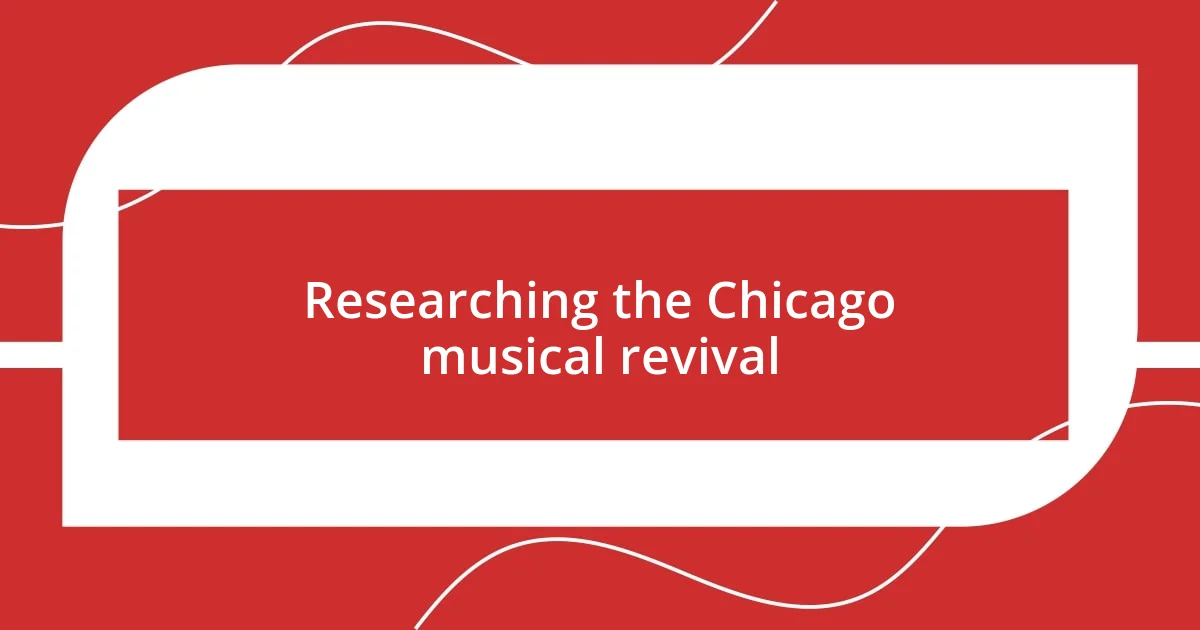
Researching the Chicago musical revival
Researching the Chicago musical revival was a journey that captivated me from the very beginning. I dove into the history of the original 1975 production, exploring how it revolutionized Broadway with its unique blend of jazz and social commentary. Have you ever wondered how a show can remain relevant across decades? It’s fascinating to see how this musical has evolved while maintaining its core themes of fame and justice.
As I sifted through articles, interviews, and recordings, I couldn’t help but feel a connection to the artists involved. Hearing their stories about the revival’s challenges really struck a chord with me. It reminded me of that feeling when you strive for something big, wondering if you’ll make it. What fuels a revival? It’s the passion behind it, and that was palpable in every piece of content I uncovered.
Each detail added richness to my understanding of the revival’s allure. The choreography caught my attention — it’s so integral to the storytelling! I found myself replaying performances, noticing how the movements told a different story each time. It raised the question, how does choreography shape our perception of a narrative? In my view, it’s the lifeblood of this revival, breathing new interpretations into the familiar lyrics and melodies.
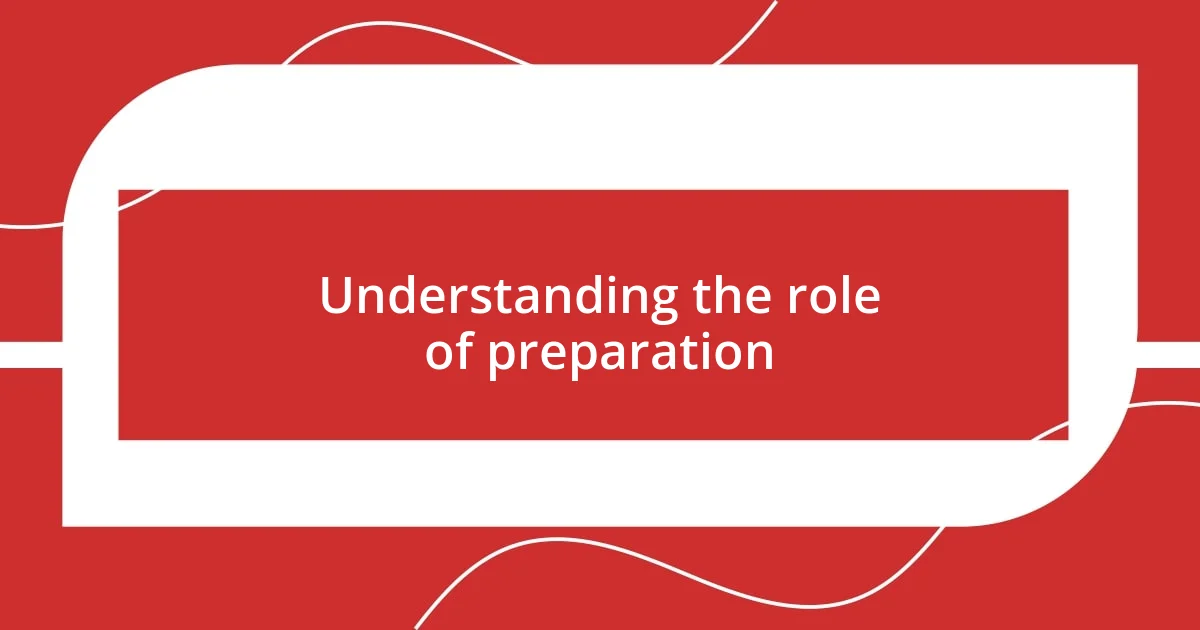
Understanding the role of preparation
Understanding the role of preparation is crucial in any creative endeavor, especially one as intricate as a musical revival. I found that preparation isn’t just about learning lines or choreography; it’s about immersing yourself in the essence of the production. For me, each rehearsal felt like peeling back layers of the show’s soul. I vividly remember the adrenaline rush as I practiced late into the night, driven by my desire to absorb every nuance.
- Preparation enables artists to connect with the material on a deeper level.
- It fosters a sense of confidence that radiates during performances.
- Engaging with fellow cast members during this phase enhances teamwork and collaboration.
- Researching character backgrounds can breathe life into interpretations, adding unique personal touches.
- Finally, every minute spent preparing pays off in the experience of fully embodying the role.
By dedicating time and effort to preparation, I noticed how it shifted my perspective and enriched my overall performance. Each detail learned was not just information; it became a thread weaving me closer to the fabric of the show. In those moments of focused practice, I realized that the groundwork laid in preparation ultimately defines your artistry on stage.
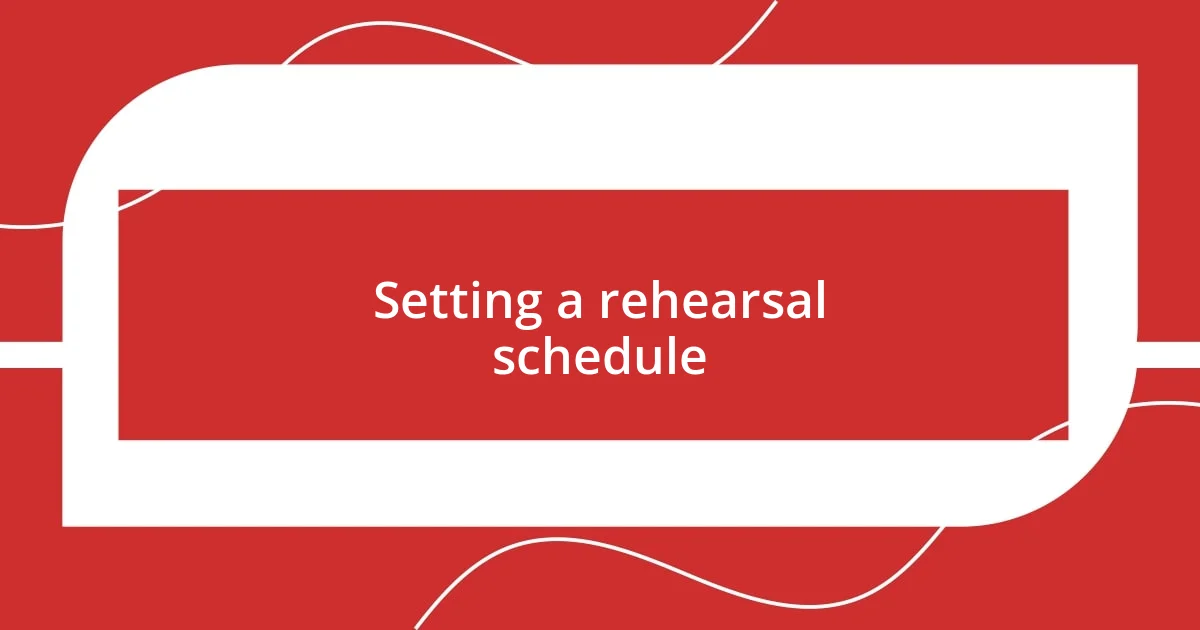
Setting a rehearsal schedule
Setting a rehearsal schedule can feel overwhelming, but I found it to be an exciting challenge. Initially, I mapped out all the aspects that needed attention: vocal practices, choreography sessions, and ensemble bonding times. It was fascinating to observe how a structured schedule didn’t just organize our practices but also created a rhythm within the cast. I remember one particularly intense week where we rehearsed late into the evening. Despite the exhaustion, the energy in the room was electric. We were creating something special together.
Creating time slots for different aspects of the production was key for me. I distinctly recall a moment when we switched gears from singing to choreography. This fluidity allowed us to maintain momentum while keeping the excitement alive. It made me appreciate how important it is to balance the technical side with artistic expression during rehearsals. How often do we lose sight of that when we’re knee-deep in schedules? Trust me, it pays to break things up while still keeping our focus on the final goal.
Here’s a comparison of actual rehearsal schedule strategies I explored:
| Strategy | Description |
|---|---|
| Block Scheduling | Focusing on specific segments, like vocals or choreography, during set times to maximize efficiency. |
| Flexible Scheduling | Allowing cast members to voice their scheduling needs to find a balance that encourages participation and creativity. |

Selecting your audition material
Selecting your audition material is a critical step that can influence the trajectory of your casting journey. I remember combing through my repertoire, feeling that familiar mix of nerves and excitement. Choosing the right piece is like finding the perfect outfit for an interview—it needs to showcase your strengths. I suggest picking a song that not only highlights your vocal abilities but also aligns with the character you want to portray. This connection can truly make your performance resonate.
When I auditioned for the Chicago revival, I gravitated toward material that communicated the essence of the show: a blend of sass and vulnerability. A memorable moment for me was when I stumbled upon a lesser-known number from the original production that captured these qualities perfectly. I practiced it repeatedly, and with each run, I felt the character’s spirit seeping into my performance. Have you ever experienced that exhilarating connection between performer and material? It’s transformative.
Ultimately, I learned that selecting audition material goes beyond just showcasing your voice. It’s about telling a story—your story—through the song. I remember one instance where a friend chose an upbeat number, but it didn’t reflect her true self. The result? A performance that felt disjointed and unconvincing. Choosing material that speaks to you personally not only makes your audition memorable but can also set you apart from other candidates.
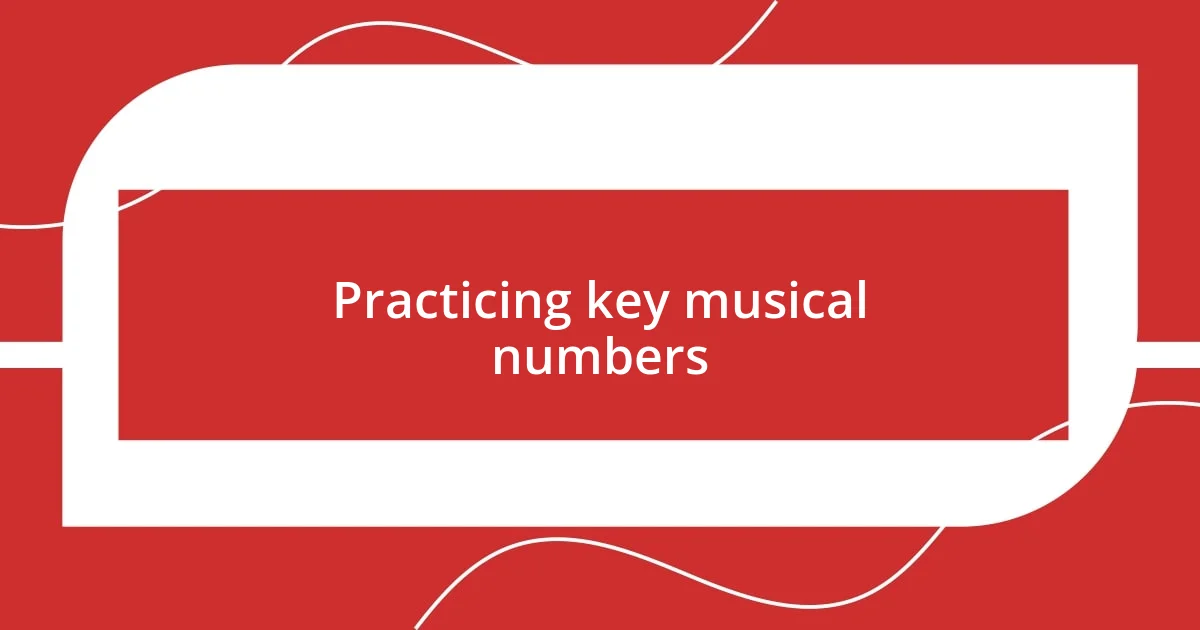
Practicing key musical numbers
Practicing key musical numbers is where the magic truly begins to unfold. I vividly recall standing in front of the mirror, belting out “All That Jazz” while trying to not get lost in my reflection. There’s something so powerful about connecting with your character through those notes. Was I just singing, or was I truly embodying Roxie Hart? Every run through felt like a mini-performance, where I could channel her energy and make mistakes without a judgmental audience.
One particularly striking moment during practice was when I invited my friend from the cast to help me refine my take on “Cell Block Tango.” I loved how we bounced ideas off each other, interpreting the lyrics together. It reminded me of how essential collaboration is in theater—each number feels like a conversation with the audience. Have you ever experienced that exhilarating rush when a simple shift in a note or a change in blocking clicks perfectly? It’s those small tweaks that can take a number from good to unforgettable.
Throughout the process, I learned the importance of not just hitting the right notes but also understanding the emotional landscape of each song. I still recall a late-night rehearsal where I struggled with “Maybe This Time.” It wasn’t just about the melody; I had to dig deep into the vulnerability of the character. That rawness made every practice feel authentic. By the end of that week, I had transformed my approach, learning that it’s okay to be a bit fragile in a performance. After all, isn’t that what makes music resonate with people?
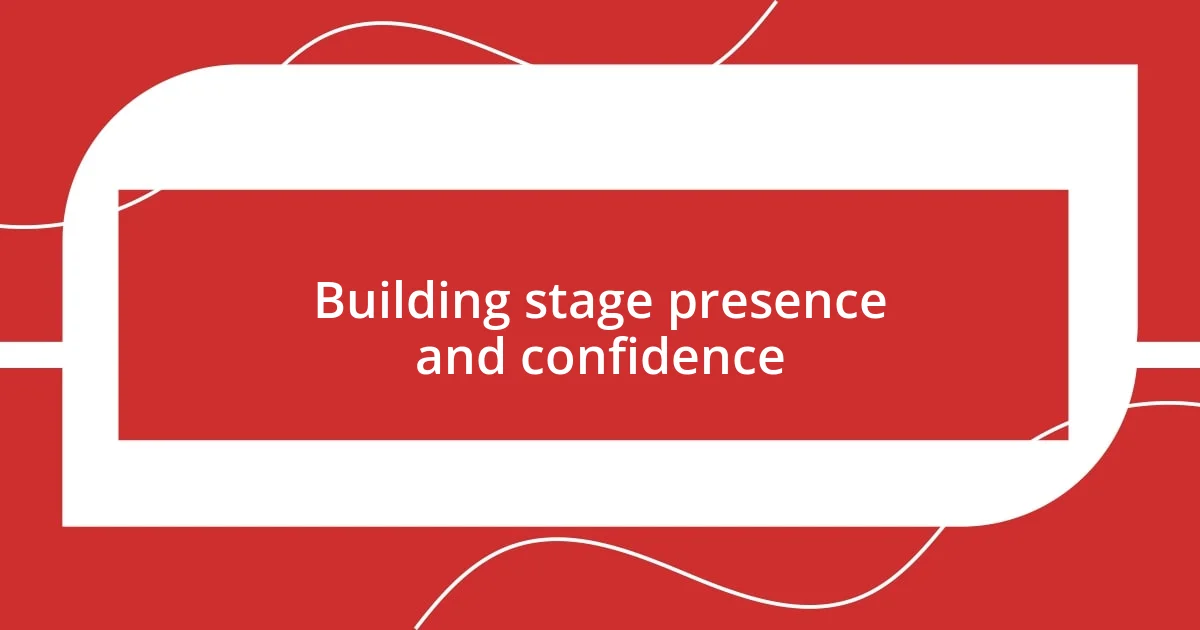
Building stage presence and confidence
Building stage presence and confidence is an intricate journey, one that I found profoundly rewarding. I remember my first rehearsal—a whirlwind of energy and uncertainty. As I stood in front of the mirror, I practiced not just my lines, but also my posture and facial expressions. Have you ever noticed how a simple change in stance can instantly convey authority? It felt liberating to realize that every gesture could tell my story.
One powerful technique that I embraced was visualizing success before stepping onto the stage. I would close my eyes and imagine myself owning the spotlight, engaging the audience, and fully immersing myself in my character. It wasn’t just wishful thinking; it transformed my mindset. I began to believe in my abilities, which in turn, enhanced my confidence. Have you ever tried visualizing a successful moment in your life? It shifts your focus from fear to possibility, and I believe that made all the difference for me right before my auditions.
I also found that connecting with my fellow cast members was vital for building confidence as well. During one rehearsal, we gathered in a circle, sharing stories of our experiences, and I could feel the walls of self-doubt crumbling away. When I stepped onto stage with that camaraderie, it empowered me. I learned that stage presence isn’t just about being the center of attention; it’s about creating a shared experience with both the audience and my fellow performers. That realization sparked a fire within me, and the result was a much more compelling performance. Have you ever felt stronger just by sharing your journey with others? It’s incredible how this connection can elevate your performance.

Seeking feedback from mentors
There were moments during my preparation when seeking feedback from my mentors became a game-changer. I remember sitting down with my vocal coach after a particularly grueling rehearsal. I felt vulnerable, eager for any insight, and their constructive criticism opened my eyes to nuances I hadn’t considered. Have you ever realized how a simple shift in perspective can elevate your work?
One instance that stands out is my conversation with my director. I had been stuck in my approach to a pivotal scene, feeling like I was missing the emotional depth. When I expressed my concerns, he encouraged me to tap into my own experiences of loss and longing. It was like lifting a weight off my shoulders. I often wonder how many opportunities for growth we miss when we don’t ask for feedback. Isn’t it fascinating how the right words at the right time can redirect your entire performance?
I’ve also found that informal chats with fellow actors can be just as enlightening. I remember collaborating with a friend who had a different interpretation of my character. As we discussed our ideas over coffee, I realized how their perspective illuminated aspects of Roxie that I had overlooked. It’s a reminder that seeking diverse opinions isn’t just about critique; it’s an invitation for deeper connections. Have you ever had an unexpected conversation that reshaped your understanding of your craft? Those moments are pure gold.




